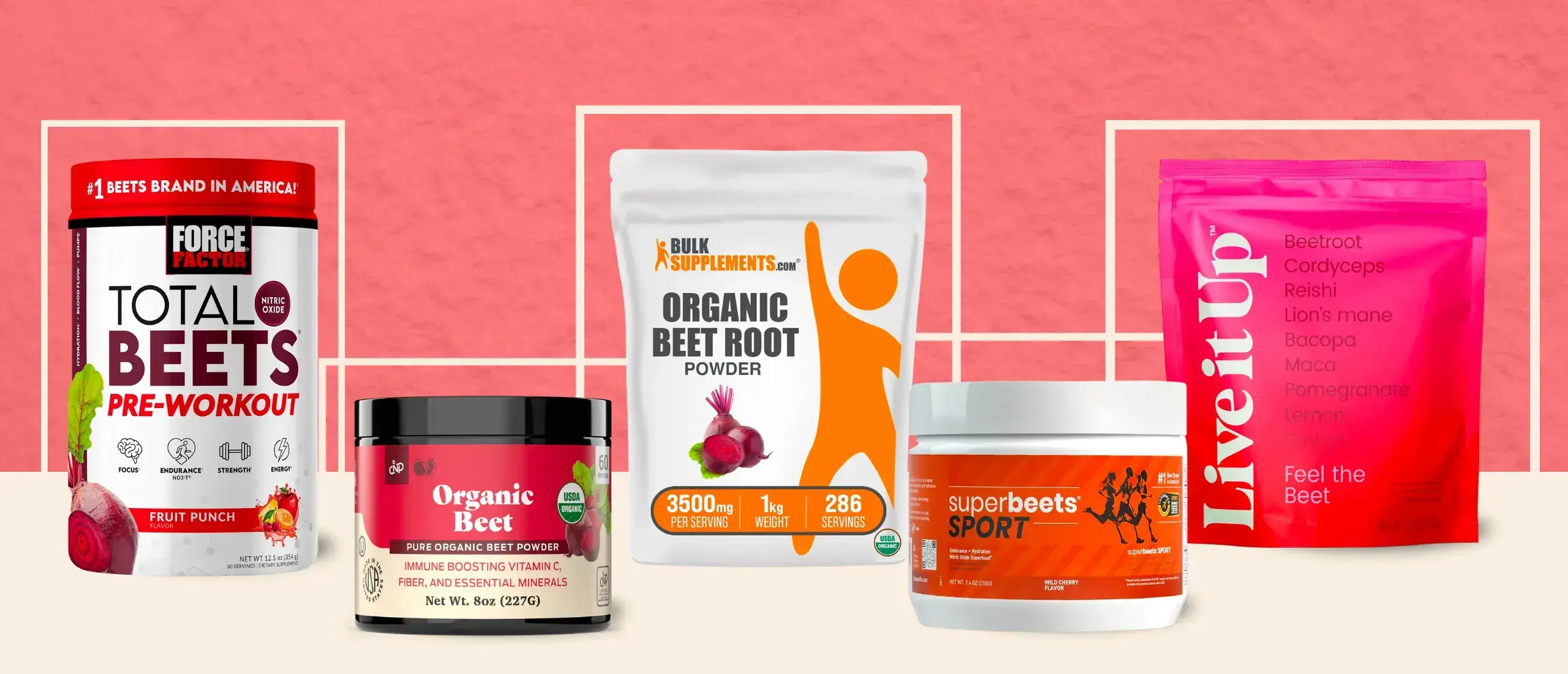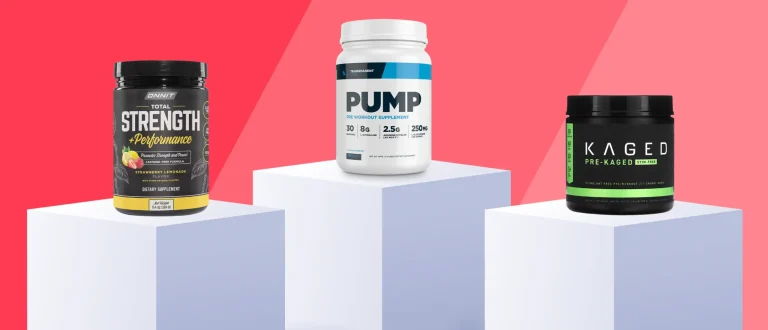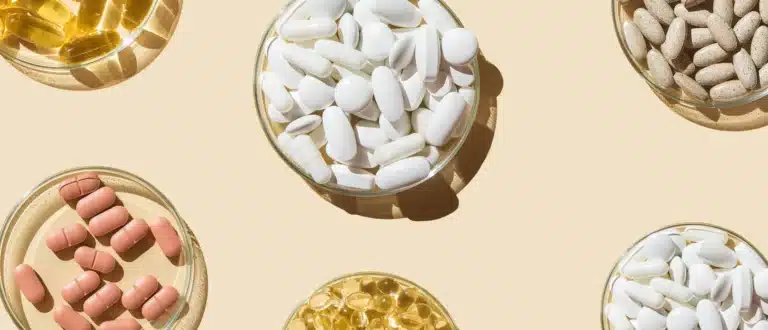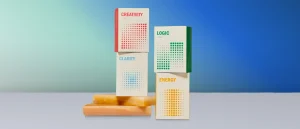The Best Beetroot Powders for a Science-Backed Health Boost
- By Will Price
- Medically Reviewed by Jonathan Valdez, RDN, LDN, CCM, CDCES, ACE-CPT
- January 2, 2024
Our product picks are editor-tested, expert-approved. We may earn a commission through links on our site.
By this point, everyone should know beets are really, really good for you. Eating beets, though? Well, most folks don’t exactly get excited about the “tastes-like-dirt” prospect. Hence the popularity of beetroot powder supplements, which nearly every Tom, Dick, and Jane supplement brand sells nowadays.
Some are straight beetroot, others come with workout-boosting add-ons, and others still target your circulatory health. Which is the best? Here’s what you need to know about the best beetroot powders you can buy, from benefits to picking the right ones.
Best overall: Live It Up Feel the Beet
Best budget pick: Bulk Supplements Beet Powder
Best for workouts: HumanN Sports Pre-Workout Powder
Why You Should Trust Us
Hone Health is a team of health-obsessed journalists, editors, fitness junkies, medical reviewers, and product testers. Before writing this guide to beetroot powder, I sifted through dozens of published, peer-reviewed research articles on the substance’s potential benefits, recommended dosages, and any adverse side effects it may provoke. In selecting products, I sought out companies that prioritize ingredient transparency, fair pricing, and third-party testing whenever possible. I’ve spent nearly 10 years reviewing tech, wellness, and health products and pride myself on identifying products that deliver value and utility to people. As with any health product or supplement, though, you should absolutely speak to your physician or a registered dietician nutritionist before taking.
About the Expert: Cesar Sauza, RDN
Cesar Sauza is a registered dietitian nutritionist with EHProject, an outlet dedicated to sharing accurate, authoritative information on nutrition, digestive health, and more. Sauza has more than a decade of experience as an outpatient dietitian on top of years of experience as a clinical nutrition manager and a decade-plus working in food safety. Sauza’s dietetic expertise lies in pediatrics, maternal nutrition, sustainable weight loss, metabolic health, obesity, and diabetes.
Beet Root Powder Benefits
May boost exercise performance
The data on nitrate supplementation—largely via beetroot juice or powder —generally, it amounts to this: supplementing with a beetroot source will provide a boost to endurance performance in some populations, and has no known negative effects on fitness (1).
In the groups it works for, it makes the body more efficiently use oxygen (2), which has a knock-on effect with nearly all forms of exercise.
“Beetroot powder contains nitrates that dilate blood vessels and should result in decreased blood pressure. Since beetroot powder helps dilate blood vessels, it makes it a good natural option for a pre-workout to have more blood flow before intense exercise,” Sauza says.
If you’re supplementing specifically for athletic performance, research says your body’s peak use of the substance occurs 2-3 hours after supplementing, so take your dose approximately 90 minutes before activity.
Potentially lowers blood pressure
In a systematic review of research conducted on nitrate from beetroot juice as a tool to combat hypertension (or high blood pressure), researchers found “[beetroot juice] supplementation has a great potential to reduce the [systolic blood pressure] and [diastolic blood pressure] values in both healthy subjects and those with cardiovascular risk.” (3) Researchers also added that because it’s a relatively cost-friendly product, it may be of particular benefit to pre-hypertensive people who may not yet need a full pharmaceutical solution. Researchers behind the review stated a consistent two-week period of use was needed for this effect to come about.
Not to mention, beetroot supplements boost nitric oxide production in the body. Healthy nitric oxide levels lower the risks of circulatory issues (4), further helping to fight hypertension.
Anti-inflammatory
The search for natural anti-inflammatory has led to more research into plant-based options (5), such as beetroot supplementation.
There are several ways researchers believe beetroot may work as an anti-inflammatory agent, but it seems like betalain, the pigment that colors beets (and a scant few other vegetables like Swiss chard or cactus pear) is a powerful bioactive antioxidant that mediates the inflammatory response (6).
Other potential benefits (6)
- Improved endothelial function: nitrate from beetroot is metabolized to nitric oxide, which plays a critical role in maintaining endothelial function, or blood flow.
- Combat oxidative stress: beetroot is dense with antioxidants, which balance cell oxidation process which, if imbalance, can lead to issues down the road
- Improved cognitive function: High nitrate diets have been found to boost activity in the frontal cortex of the brain, which is responsible for cognitive processes such as executive function, working memory and task-switching. Beetroot is extremely high in nitrates.
The Best Beetroot Powders on the Market
Beetroot Powder Dosage Recommendation
“Beetroot powder studies are limited and there is no established dosing,” Sauza says.
His recommendation is to start small, usually with one-third of the recommended serving on whichever beetroot supplement you buy. So, if the recommended serving size on the supplement is 1 tablespoon, begin by supplementing with 1 teaspoon for a few weeks before increasing the dose. This way you get a sense of how your body reacts to the substance, and how much you really need.
Beetroot Powder Side Effects (Who Shouldn’t Take Beetroot Powder?)
A natural solution to high blood pressure—and a potentially effective pre-workout supplement, among other things—is great, but if you have naturally low blood pressure, beetroot powder may not be for you.
“Beetroot powders can lower blood pressure, therefore patients with low blood pressure, to begin with, should avoid taking beetroot. There is also a possibility of beetroot interacting with blood pressure medications or even anticoagulants like warfarin,” Sauza says.
Note: Not all drug or supplement interactions may be addressed here, so it’s important to follow up with your physician, pharmacist, or a registered dietitian nutritionist before taking beetroot powders if you’re on medications.
Our product picks are editor-tested, expert-approved. We may earn a commission through links on our site.
References
-
Kerksick, Chad M. et al (2018). ISSN exercise & sports nutrition review update: research & recommendations. https://www.ncbi.nlm.nih.gov/pmc/articles/PMC6090881/
-
Dominguez, Raul et al (2017). Effects of Beetroot Juice Supplementation on Cardiorespiratory Endurance in Athletes. A Systematic Review. https://www.ncbi.nlm.nih.gov/pmc/articles/PMC5295087/
-
Bonillo Ocampo, Diego A. et al (2018). Dietary Nitrate from Beetroot Juice for Hypertension: A Systematic Review. https://www.ncbi.nlm.nih.gov/pmc/articles/PMC6316347/
-
Lara, Jose et al (2015). Effects of inorganic nitrate and beetroot supplementation on endothelial function: a systematic review and meta-analysis. https://pubmed.ncbi.nlm.nih.gov/25764393/
-
Joao, Calixto et al (2004). Anti-inflammatory compounds of plant origin. Part II. modulation of pro-inflammatory cytokines, chemokines and adhesion molecules. https://pubmed.ncbi.nlm.nih.gov/14994184/
-
Clifford, Tom et al (2015). The Potential Benefits of Red Beetroot Supplementation in Health and Disease. https://www.ncbi.nlm.nih.gov/pmc/articles/PMC4425174/












